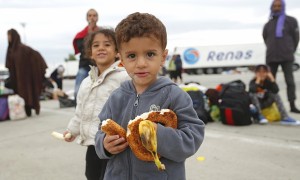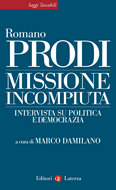Il fallimento morale (ed economico) di Cameron sui migranti
 Cameron’s moral failure over refugees ‘will cost him Europe negotiation’
Cameron’s moral failure over refugees ‘will cost him Europe negotiation’
Former president of European commission Romano Prodi says hopes of successful talks with Brussels will be damaged
Daniel Boffey Interviews Romano Prodi on The Guardian of September 5th 2015
Britain’s failure to live up to its “moral obligation” to accept a fair quota of refugees from Syria will damage David Cameron’s hopes of achieving a successful renegotiation with Brussels, a former president of the European commission has claimed.
As the first group of what is expected to be some 10,000 people was greeted in Munich, Romano Prodi, a former Italian prime minister and EC president, condemned Britain’s stance on the crisis and warned of dire consequences for Cameron ahead of the UK’s in/out EU referendum.
The German chancellor, Angela Merkel, has called on EU states to accept their fair share of asylum seekers, based on factors such as population, GDP or jobless rates.
New data from the UNHCR showed that 366,402 migrants have crossed the Mediterranean this year, with 2,800 dying or going missing en route.
However, Cameron has rejected any involvement in the compulsory quota scheme, saying it would encourage “dangerous journeys” across the Mediterranean.
Following the outpouring of emotion after the death of Aylan Kurdi, found washed up on a Turkish beach, the prime minister merely pledged to take in an unspecified number of further refugees from camps in Turkey.
In an interview with the Observer, Prodi said the UK should have recognised the moral imperative – and economic benefit – of taking up its quota, which would have amounted to some 18,000 people.
He said: “I do think there is a moral obligation, but I don’t expect anything will be done [by the UK].
“Some 18,000 people for the UK is nothing, not at a time when the economy is going well.
 “This is a general problem, the contradiction of the British negotiation. I think it will not be easy for Cameron to have a positive deal in order to come back to London and say ‘Look, I got a lot from Brussels’.”
“This is a general problem, the contradiction of the British negotiation. I think it will not be easy for Cameron to have a positive deal in order to come back to London and say ‘Look, I got a lot from Brussels’.”
He added: “Mrs Merkel’s position was not just a message of EU cohesion, but was also an intelligent proposal for the German economy because Syrian immigrants are appropriate to the German needs – the shrinking of population and the need for skills – 40% of the Syrians are graduates.”
Speaking to reporters at a meeting of G20 finance ministers in Turkey, the chancellor, George Osborne, insisted that resettling refugees could only be one element of a wider plan.
He said the problem had to be dealt with “at source”, which meant tackling both the “evil” regime of Syrian president Bashar al-Assad and the militant jihadists of Islamic State.
“You need a comprehensive plan for a more stable, peaceful Syria – a huge challenge of course, but we can’t just let that crisis fester. We have got to get engaged in that.”
However in a letter signed by hundreds of academics and published in the Observer, experts on community cohesion, asylum, refugees, migration and law, insist: “The government’s position on the refugee and migration crisis is misguided and requires urgent change.”






















